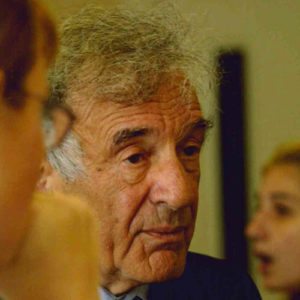My story is unique in how I became a student of Elie Wiesel’s at Eckerd College. I distinctly remember reading Night, by Dr. Wiesel, my freshman year of high school. Our assignment was to write a letter to him, reflect on his memoir and express what resonated on a personal level. I took that opportunity to ask how he navigated the roles of testimony and steward. When I received a response letter from Dr. Wiesel, I felt as though he had bestowed the roles of testimony and steward on me. It was as simple as that in my mind. Indirectly, I was given an invisible link to the preservation of his memory. Not in my wildest imagination did I believe I would sit next to him and hold conversations on the role of memories and witnesses in life, and how that interplays with universal truths of humanity.
While still in high school, I read that Dr. Wiesel had a strong relationship with Eckerd College; he taught classes for a select group of students on the campus. I merely dreamt that one day I would be one of those students, honored with the opportunity to attend his class. The winter of my sophomore year at Eckerd, I sat in a room with 15 other students in front of Dr. Wiesel himself. I still can’t find the right words to describe how sacred that moment in time felt to me. It was a pivotal moment in my life. This survivor of the Holocaust, this Nobel Laureate and “messenger to mankind,” was sitting right in front of me, speaking to me. “Think higher and feel deeper,” he said as he ushered us onto a path of understanding through the role of witness. Three weeks of learning from and forming a personal relationship with Dr. Wiesel awoke a conviction for justice and authenticity within me.
At the time, it seemed unnatural to declare our class, The Witness, to be coming to a closure. Perhaps this is because there is not much truth to that statement. Though our class wouldn’t meet for any further discussions, and Dr. Wiesel would have to resume his public role as “messenger to mankind,” each student was bestowed the role of witness. That invisible link became a network of shared memories. Sharing memories allows people who were not witnesses to an event to become secondhand witnesses, ever extending the invisible link, suspending forgetfulness and denial. The role of the witness is a testament to the condition of being human. As humans we have a capability to control the fate of our humanity through the role of witness. To me, the memory of Dr. Wiesel is asking more from humanity. More learning, teaching, listening, telling and witnessing will amount to more memories. In the end, though each individual’s memories are unique and singular, it is the ability of humans to relate, show compassion and become witnesses to another’s memories that produces collective memory. I witness because I am human. I am human because we are. I am so humbled and grateful for my time shared with Dr. Elie Wiesel, both transformative and empowering, which has forever changed my life and the way I experience it.
—Amanda Sosnowski ’13


